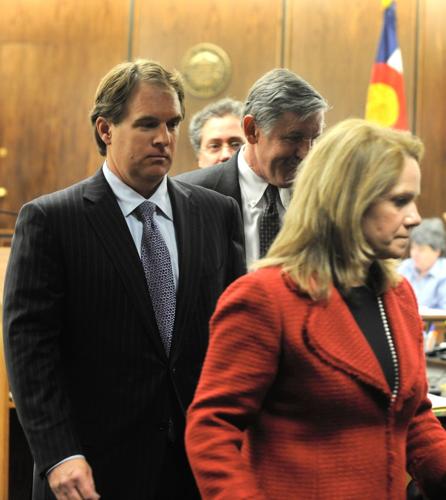Disciplined judges, after stepping down, show up in municipal courts
Not long after 18th Judicial District Judge Natalie Chase resigned over a series of inappropriate racial remarks, she was back on the bench — as a municipal judge in tiny Deer Trail and as a traffic referee in Fort Collins.
Despite a public censure by the state’s judicial discipline commission and her resignation in April 2021, Chase landed the part-time jobs within a few months and held them simultaneously for the next three years, according to payroll records from both locations obtained by The Denver Gazette.
Chase is one of at least a half dozen jurists who resigned or retired in the past decade over discipline issues they faced, nearly all of them private sanctions the public never knew about, then reappeared in another lower-level courtroom on the public payroll, The Denver Gazette has learned.
That’s because the Colorado Code of Judicial Conduct requirement to self-report infractions that applies to state court judges — county, district, appellate, supreme court judges — doesn’t apply to the lower municipal court system unless the city or town chooses to require it.
Additionally, state judges who are forced to resign typically sign consent orders with the judicial discipline commission that say they are barred from returning to the bench.
But that only applies to state courts, not the municipal ones.
And disgraced judges’ law licenses are rarely affected by any discipline, so they’re not barred from further taking on judicial-type jobs, such as an arbitrator or a mediator.
Only the names of those judges whose discipline was public are being identified. Others contacted by The Denver Gazette whose discipline was private would not confirm the information. Several did not respond to efforts to reach them.
Although the discipline commission’s work is confidential unless a public discipline is issued — as occurred with Chase — its rules allow government bodies, such as a municipality or town, to ask if a sitting state court judge or former judge applying to another judicial position has any history of discipline.
But that’s not happened.
“The federal government was the only non-state judicial entity that made requests for background information about a judge’s discipline history,” said Christopher Gregory, the commission’s executive director from 2022-2023 and a commission member from 2017-2021, including a stint as its chairman.
“There was never an inquiry from a municipality, from a township or any other local government body,” he said. “But the provision is there in the rules for them to ask and find out.”
In virtually every case, biographical information on the judge’s webpage reflects nothing about any discipline they faced, their resignation or retirement or the reasons behind it. Instead, they offer plaudits and kudos.
“Ms. Chase’s knowledge of the bench helps her clients through some of the most difficult times in their lives and she can explain what judges are looking for in different types of cases,” her biography on the Hampton & Pigott law firm’s website reads. “Her dedication to helping those in need is unparalleled.”
When Chase was named Deer Trail’s municipal judge in January 2022, she replaced former El Paso District Court Judge Jonathan Walker, who retired while on paid suspension in 2017 rather than face state disciplinary hearings over allegations of harassment, retaliation and improperly modifying plea agreements. Walker disputed the claims.
The Deer Trail town board of trustees replaced Chase in May 2024, records show. Her replacement, former Douglas County District Judge Paul King, has no record of discipline. He retired from the state bench in 2018.
Deer Trail Mayor Judd Behrens, the only town official left on the board to have hired Chase, did not respond to efforts by The Denver Gazette to reach him for comment.
In other cases, the newspaper found several judges who had retired or resigned with discipline cases pending against them, later popping up as professional mediators. A mediator is a go-between to help people involved in a dispute come to a resolution.
They include former 5th District Judge Mark Thompson, who was twice disciplined over anger issues, one of them for brandishing an assault rifle at his stepson and another for lashing out at attorneys in his courtroom after returning from a suspension that required anger-management classes.
Thompson retired in January 2023 and now runs High Country Mediation.
“Mark is a Colorado native and served as district court judge in Colorado’s 5th Judicial District for 12 years from 2010 until 2023,” his website reads. “As Chief Judge, he presided over the 5th Judicial District’s district-wide grand jury and served on a variety of state-wide committees. … Other interests include cycling, banjo, fishing, hunting, alpine climbing, reading and cooking.”
Another is former 18th Judicial District Judge John Scipione, who resigned in January 2023. He was later censured by the commission for not disclosing a sexual relationship with a staff member, for inappropriately discussing his sexual preferences, and for attempting to influence the outcome of a court case in a different jurisdiction.
He is a mediator at EquiResolve, records show.
“Our founder and principal, Hon. John E. Scipione (ret.), brings a wealth of judicial insight to our practice,” EquiResolve’s website reads. “With a decade of judicial experience and nearly three decades navigating the intricacies of the legal system, John E. Scipione is committed to upholding the highest standards of professionalism and fairness.”
And former 17th Judicial District Judge Robert Kieznowski retired in July 2023 after admitting to the commission about a campaign of retaliation he did against a court staffer for allegedly gossiping about an extra-marital affair he was having.
Kieznowski is a mediator with Mountain West Arbitration and Mediation Services.
Kieznowski, Scipione and Thompson did not respond to efforts by The Denver Gazette to reach them.
While many former judges in Colorado work as mediators or arbitrators at firms composed entirely of retired jurists — Judicial Arbitration & Mediation Services and Judicial Arbiter Group are the most well-known — a number of them have chosen to hang their own shingle.
Nothing prevents them from staying quiet about their past.
That’s troubling to professional mediators.
“Mediators must be individuals of high moral character who can inspire trust and confidence in the parties they serve,” said Tanya Haggins, co-founder of the New York City-based National Association of Certified Mediators and the president of Lakewood University in Cleveland Heights, Ohio. “Allowing individuals with unresolved ethical issues to practice as mediators risks eroding public trust in this critical alternative to litigation.”
Moreover, Haggins said, a judge’s experience isn’t enough to simply call themselves a mediator, especially when they’re bringing personal baggages.
“I firmly believe that simply allowing retired judges or individuals with ethical discipline issues to market themselves as mediators without proper training and oversight undermines the integrity of the mediation profession,” she said.
Municipal judges are not universally required to follow the same rules as state judges, a system loophole that allows for discipline histories to remain quieted.
“We are not strictly held to the same judicial canons, which are really for the state’s full-time judges,” said Joe Jefferson, Englewood’s municipal judge and the president of the Colorado Municipal Judges Association. “Some municipalities have integrated that into the contracts with their judges and held to the standard in their employment contract. But it’s largely used as a guiding light for our judges, often talking about the ideals of the canons.”
Jefferson noted that a secretive discipline process at the state level isn’t helpful.
“Keep in mind that the state’s judicial discipline proceedings are not public and sometimes the hiring municipality is hiring the pickle jam you describe,” he said. “They might not know and are left with a resume or whatever their human resources can find out.”
Ensuring municipal courts are held to the same ethics as the higher state level courts is as important, Jefferson said.
“The reality is it’s a fundamental issue of public trust. Our municipal courts serve the community in ways state courts cannot,” he said. “Our level of court helps people correct the behaviors before it becomes even more serious.”
The judges hired to do that job should be held to the same standards, he said.
“The idea is that the hiring process ensures the public trust and the third branch of government,” Jefferson said. “It factors into people’s compliance with the law. If the judge isn’t a legitimate source of authority, why bother to comply?”








